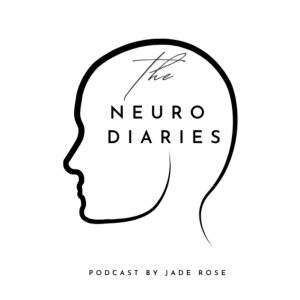
Wednesday Sep 18, 2024
Ep 7 - Bipolar 1 with Polly Wiseman
Polly Wiseman, a theatre maker and mental health advocate, discusses her work in the theatre space and her play 'How to Go Crazy for Good' which aims to transform the way people see mental illness. She shares her experience with bipolar disorder type 1 and describes the extreme moods and symptoms she experiences during manic and depressive episodes.
Polly talks about the challenges of managing her condition publicly and the stigma and prejudice she faces. In this conversation, Jade Rose and Polly share their personal experiences with diagnosis and treatment, emphasizing the importance of self-advocacy and finding a supportive community.
The conversation explores the early signs and symptoms of bipolar disorder, the challenges of living with the condition, and the potential benefits and drawbacks of being neurodivergent.
Overall, the conversation aims to break down stigma, normalize mental health discussions, and provide support and understanding for those living with bipolar disorder.
Keywords
theatre, mental health, bipolar disorder, creativity, stigma, prejudice, bipolar disorder, stigma, awareness, education, support, workplace, healthcare system, diagnosis, treatment, self-advocacy, community, early signs, symptoms, neurodivergent
takeaways
- Polly Wiseman is a theatre maker and mental health advocate who aims to transform the way people see mental illness through her work
- She has bipolar disorder type 1 and experiences extreme moods and symptoms during manic and depressive episodes
- Managing her condition publicly in the theatre industry has been challenging due to stigma and prejudice
- Self-awareness, self-care, and finding a balance between work and mental health are important for managing bipolar disorder There is a need for more awareness and education about bipolar disorder to combat stigma and improve understanding.
- The workplace and healthcare system should provide better support and accommodations for individuals with bipolar disorder.
- Self-advocacy is crucial in navigating the healthcare system and receiving an accurate diagnosis.
- Finding a supportive community can be beneficial for individuals with bipolar disorder.
- Early signs and symptoms of bipolar disorder may include changes in appetite, sleep patterns, energy levels, and mood.
- Living with bipolar disorder can be challenging, but it is possible to find ways to manage the condition and lead a fulfilling life.
- Being neurodivergent can have both positive and negative aspects, and it is important to challenge stigma and promote acceptance and understanding.
titles
- Living with Bipolar Disorder: Extreme Moods and Symptoms
- Transforming the Perception of Mental Illness through Theatre Embracing Neurodivergence: The Benefits and Drawbacks
- Recognizing Early Signs and Symptoms of Bipolar Disorder
Quotes
- "Our mission is to present extraordinary theatre in unexpected places"
- "During a manic episode, everything seems very bright and exciting"
- "The unpredictability of bipolar disorder can be frustrating and impact plans"
- "I think that's when most people draw back instinctively."
- "The more awareness that we can get out there is actually going to make the people who experience it be able to get help and get understanding before they get to that point."
- "There are so many factors where the healthcare system is not fit for purpose, and especially when it comes to mental health.
No comments yet. Be the first to say something!